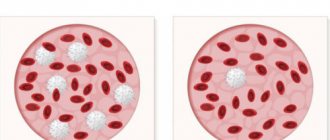Services table
| Service name | Price |
| Initial consultation with a gynecologist | 2,300 rub. |
| Ultrasound gynecological expert | RUB 3,080 |
| Taking a smear (scraping) for cytological examination | 500 rub. |
| Complex “Reproductive Potential” Hormonal assessment of ovarian follicular reserve (AMH.FSH,LH,estradiol) | 1,900 rub. |
| Determination of testicular reserve, FSH stimulation test with cost of the drug | 5,000 rub. |
| FSH | 650 rub. |
| FSH (CITO) | 950 rub. |
| FSH (express) | 650 rub. |
What is follicle stimulating hormone (FSH)?
Follicle-stimulating hormone, otherwise called follitropin , is a hormone responsible for reproductive function and human puberty.
In the female body, the hormone promotes the formation and development of the follicle.
As you know, the follicle is what promotes the maturation of the egg and also produces estrogens in the woman’s body, which is important for further fertilization.
In the body of men, the main function of such a hormone is to help in the formation of spermatozoa necessary for conceiving a child.
FSH as an indicator of ovarian reserve
In reproductive medicine, determining the level of FSH is used to assess a woman’s ovarian reserve. Ovarian reserve is the reserve of eggs. A woman is born with a certain amount of them, which only decreases throughout her life. As a result, a moment comes when the oocytes stop maturing at all. This usually occurs no earlier than 40 years of age. If the eggs stop maturing earlier, the condition is called premature ovarian failure.
Ovarian reserve is not measured in specific numbers. For example, it is impossible to say from the examination data whether there are 100 thousand or 30 thousand eggs left in your ovaries. The concept of ovarian reserve includes several main indicators that are assessed comprehensively:
- AMH level – the higher the better;
- FSH level – the higher, the worse;
- the number of antral follicles in the ovaries (the more, the better, but the worst thing is if there are less than five).
There are other indicators that are also sometimes used (ovarian volume, inhibin-B, ovarian response to gonadotropin stimulation).
FSH is one of the main indicators of the preservation of reproductive function. The concentration of this hormone depends on several factors, but most importantly on the level of estrogen. The more there are, the less FSH. And vice versa: the lower the concentration of estrogen, the higher the concentration of follicle-stimulating hormone.
Is it possible to reduce FSH?
Many women suffering from infertility ask their doctor if there are drugs that can affect high FSH. Theoretically this is possible. But there is no practical sense in this. Because FSH is just a reflection of estrogen deficiency, which, in turn, indicates depletion of the ovarian reserve. Thus, using drugs to lower FSH levels is the same as trying to cure a fever by moving a thermometer from the armpit into cold water: the diagnostic results will change, become more favorable, but this will not solve the problem.
USEFUL INFORMATION: Embryo cryopreservation
The best thing a woman can do if her FSH level is elevated is to get pregnant as quickly as possible. Because further delaying the start of treatment will only lead to the fact that ovarian function is completely depleted.
Methods of treating infertility against the background of high FSH:
- prescribing clomiphene citrate to induce ovulation;
- if there is no ovulation for 3 months or pregnancy does not occur after 6 cycles, stimulation of ovulation with gonadotropins is indicated;
- If there is no pregnancy again within six months, IVF is considered.
In vitro fertilization against the background of a high level of FSH has its own characteristics. Programs with minimal stimulation are often used, since the ovaries often respond poorly to gonadotropin drugs. Reducing the dosage of medications allows you to obtain fewer eggs, but of higher quality, which increases the likelihood of pregnancy. If FSH is too high and it is not possible to obtain her own cells, the woman is recommended an IVF program with donor oocytes.
What is it responsible for in a woman’s body?
As you know, to conceive a child, you need not only an egg and the presence of hormones - estrogens, but also the required volume of other hormones, on which favorable conditions for further conception depend.
Now it becomes clear why it is necessary to control the level of hormones and the state of the hormonal system.
First of all, such hormones are responsible for the further conception of a child. That is, if there is not enough FSH hormone in a woman’s body, then the development of the follicle will not proceed as necessary.
Accordingly, the egg will not mature, and there will not be enough estrogen at all. All these conditions are very important for conceiving a child.
Follicle-stimulating hormone is responsible for reproductive function in women, and at a younger age, for female puberty.
As you can see, the role of such a hormone is quite large and important. Therefore, when a couple is unable to conceive a child, first of all, it is necessary to look for the reason in the hormonal system. It is important to monitor the state of the hormonal system and the amount of necessary hormones.
High FSH and pregnancy
The hormones of the female body have been studied very little. An increased rate is primarily an abnormal psychological situation and an incorrect lifestyle. Spontaneous pregnancy with elevated levels is extremely rare, and in most cases the fetus is not viable.
To normalize hormone levels, you should contact a qualified fertility specialist or resort to artificial insemination. But before coming to the fertilization process, a woman must undergo a course of medication therapy. The latter artificially stimulate a decrease in the FSH hormone, which will allow successful ovulation and fertilization of the egg.
Watch a video about follicle-stimulating hormone:
Thus, hormonal levels for the female body are very important. FSH is responsible for reproductive function. Therefore, any result different from the norm does not have a positive impact on the girl’s general condition. To achieve the desired pregnancy, it is recommended to undergo examination and treatment.
The relationship between cycles and hormones
As has already become clear, a woman’s body is a rather complex system, which is not so easy to understand.
If this is a system, then, accordingly, everything in it is interconnected. What is the connection between menstrual cycles and hormones?
Many women are surprised where problems with menstruation come from.
After all, many have probably observed irregular menstruation, as well as a common problem - cycle failure. Causes of menstruation failure:
- Firstly, the hormonal system is the first thing that affects a woman’s menstrual cycle. That is, an elementary imbalance of the hormone in the body - disturbances in the regularity of cycles already appear.
- Secondly, such problems can arise against the background of stressful situations and depression. This is not uncommon.
Everyone knows that in addition to menstruation, a woman has several cycles without which a woman’s reproductive system will not work.
Such cycles are called phases and they are different. At different periods of time, the phases differ from each other and have completely different names and character of manifestation.
There are several cycles:
- Follicular phase of the cycle . This phase lasts from the first to the fourteenth day of the cycle.
- Ovulatory phase of the cycle . As you know, this is only a couple of days - the fourteenth and fifteenth days.
- Secretory phase of the cycle. The fifteenth day, the beginning of a woman’s menstruation.
Separately from the above phases, we highlight two more:
- Premenopause;
- Postmenopausal.
After the birth of a girl, the hormone level begins to increase sharply. Then, after some time, the hormone level gradually decreases. At about a year or two, the hormone levels begin to decline.
Before puberty, the hormone rises again. And later, when the girl has gone through puberty and has regular menstruation, the hormone level changes depending on what phase of the cycle the girl is in.
When is an FSH blood test prescribed?
Traditional medicine has been using FST blood test data for many years to treat disorders in the reproductive system.
Indications for the study are the presence of the patient:
- Infertility.
- Oligomenorrhea or amenorrhea.
- A woman's inability to carry a pregnancy to term.
- Deviations in sexual development (very early or, conversely, too late).
- Anovulation.
- Endometriosis.
- Uterine bleeding, the etiology of which is not determined.
- Decreased potency.
- Polycystic ovary syndrome.
- Sudden loss or, conversely, increase in body weight.
An FSH blood test may also be prescribed after hormone therapy to monitor its effectiveness.
Analysis for FGS
As noted earlier, analysis of FGS is quite important for assessing the hormonal state and hormone levels in a woman’s body.
The indicators of such an analysis may vary depending on the time period in which it was carried out. The phase of the cycle a woman is in plays a big role. This feature must be taken into account.
How is it carried out?
This test is carried out strictly on an empty stomach.
It is recommended to take the test in the morning or early afternoon. The test is usually scheduled on the fifth or twentieth day of a woman’s menstrual cycle.
The test is carried out by drawing blood. Before the procedure, you need to get enough sleep. Avoid the use of both alcohol and tobacco products.
Venous blood is used to collect blood.
When is it held?
As noted earlier, blood is donated on an empty stomach in the morning. As a rule, doctors prescribe such a test on the fifth or twentieth day of the menstrual cycle.
Preparing for analysis
Very often, before taking the test, you need to follow many rules that affect the preparation of the material.
First of all, it is necessary to exclude the consumption of alcohol and tobacco products the day before. It is necessary to get enough sleep and exclude morning food for breakfast. Blood is drawn on an empty stomach.
There are a number of other recommendations that must be followed:
- prepare a list of medications that are being taken at the time of the test (the list should include all medications without exceptions);
- women need to wait until the fourth to seventh day of the menstrual cycle;
- stop sexual intercourse in advance and exclude active physical activity;
What to do if a high or low value is detected
If the hormone level decreases or increases, it is recommended to do an ultrasound of the genital organs, and, if necessary, magnetic resonance or computed tomography. These examinations help to identify the true cause of the deviation in the amount of follicle-stimulating hormone.
If the level is high, replacement therapy is prescribed. The choice of drug is made depending on how much the value has increased or decreased. If there is a decrease, drugs are prescribed that increase the amount of FSH.
Blood tests for this parameter are important for the diagnosis and treatment of a large number of serious diseases. Patients should not ignore this examination.
Many patients suffer from infertility. In order to get pregnant, it is recommended to undergo a series of tests, as a result of which you can determine whether there are changes in the hormonal background, the release of follicle-stimulating hormone.
When a woman's FSH level is detected, this means a normal condition. But in some cases, patients come with a completely different problem.
FGS indicators are normal
Of course, in every analysis there are established norms, as well as deviations.
FGS indicators are always different and there is an explanation for this - the phase of the cycle in which the woman is at the time of taking the tests.
It should be noted that even trivial reasons—emotions and stress—can affect the analysis indicators. Before surrendering, you need to relax and calm down.
Each age has its own norm for the FGS indicator. The age category of the patient is very important. Reproductive age is significantly different from the period when puberty has not yet occurred.
Before puberty
The period when girls are still in the “Pre-puberty” stage ranges from the ages of six to twelve years. The FGS indicator is normal when the analysis result determines 4.5 mU/ml.
During reproductive age
The indicator at reproductive age, of course, differs from what it is in the period before puberty. This is due to hormonal changes in girls’ bodies.
Reproductive age begins from the moment when a woman has passed puberty, she is formed as a woman and she has established a regular menstrual cycle.
During this period, it is important what phase of the cycle the girl is in at the time the blood test is taken. Why?
Indicators vary depending on the phase of the cycle:
- Being in the follicular phase of the cycle , the norm for FGS analysis is from 2.45 to 9.47. The cycle phase lasts from the first to the fourteenth day of the menstrual cycle.
- Being in the ovulatory phase, the norm for FGS analysis is indicators from 3.0 to 21.5. A woman is in the cycle phase on the fourteenth and fifteenth days.
- Being in the secretory phase of the cycle, the norm for FGS analysis is from 1.0 to 7.0. A woman enters this phase of the cycle on the fifteenth day of the onset of menstruation.
As you can see, the indicator varies depending on what phase of the cycle the woman is in. Throughout the menstrual cycle, the hormonal system changes, as do the phases.
During menopause
The menopause period is divided into two main periods:
- Premenopause . Being in the premenopausal period, the norm for FGS analysis is from 25.8 to 134.8.
- Postmenopausal. Being in the postmenopausal period, the norm for FGS analysis is from 9.3 to 100.6.
As you can see, in two different periods of menopause, the indicators also vary and differ from each other. The explanation for this is hormonal changes that manifest themselves differently at different stages of menopause.
Increased FSH in women
Increased FSH in women is observed in a number of pathological conditions of the hypothalamus, pituitary gland, ovaries and in some somatic extragenital diseases.
Elevated FSH in the follicular phase of the menstrual cycle is physiological, unless it goes beyond the normal range in the specified interval on a given day of the cycle.
The reasons for the increase in FSH in women with pathology and the consequences of this:
- Premature puberty. It begins with the appearance of thelarche - the formation of the mammary glands, as well as hair growth in the armpits and pubic area, that is, from the moment of development of secondary sexual characteristics. After this, menarche occurs - the first menstruation. The early onset of thelarche and menarche may indicate precocious puberty, which can be confirmed by a hormonogram, in particular a test for follitropin.
- Ovarian hypofunction, which manifests itself in the form of ovarian failure in premature ovarian failure syndrome. This condition develops if menopause occurs before age 40. In this case, estrogen is not produced in sufficient quantities, the cycle is disrupted, the follicles do not mature and ovulation becomes impossible. Primary ovarian failure can be caused by severe stress, severe infectious diseases, autoimmune processes, chemotherapy, and alcoholism. Iatrogenic genesis of the pathology during ovarian resection is possible.
- Genetic pathologies. An increase in FSH is characteristic of Shereshevsky-Turner syndrome and Swyer syndrome. Cysts and tumors of the ovaries.
- Hormone-producing tumors of various locations.
- Endometriosis.
Also, if FSH is elevated, in women the reasons may be due to taking medications. These include: danazol, bromocriptine, tamifen, glucocorticoids, antifungals, tamoxifen, hypoglycemic drugs.
Depending on the reason that caused the increase in FSH, an individual treatment regimen is prescribed, for example:
- If follitropin increases with hyperprolactinemia, bromocriptine or dostinex is prescribed;
- In case of a pituitary tumor, consultation with a neurosurgeon and, if necessary, surgical treatment are necessary;
- For ovarian cysts and tumor-like formations, medical or surgical treatment is carried out depending on the nature and size of the formation;
- In case of ovarian failure, hormone replacement therapy is performed.
The ratio of FGS and LH (luteinizing hormone) for pregnancy
Follicle-stimulating hormone is produced in the region of the anterior pituitary gland.
Together with follicle-stimulating hormone, another equally important hormone is released - luteotropin .
Two important components - hormones - act together and function in combination.
The union of two hormones primarily contributes to ensuring the ability to continue the human race.
It makes no sense to consider the indicators of one hormone. In fact, these two hormones are inseparable and it is pointless to evaluate indicators without each other.
In the period from the third to the eighth day of a woman’s menstrual cycle, FGS has a greater concentration than LH by about one and a half to two times.
In the first days of the menstrual cycle, the ratio of LH to FSH is reduced by approximately one unit, which helps create favorable conditions for follicle maturation, the importance of which is great for any woman. During this period, the woman is ready to conceive.
What the analysis shows
This study is an important stage in the diagnosis of diseases associated with disorders of the pituitary gland. The analysis can be done in any clinic or laboratory. Modern diagnostic centers have techniques for accurately and quickly determining this hormone in the blood.
A blood test for follicle-stimulating hormone shows its concentration. Changes in the indicator relative to the norm indicate the presence of certain pathologies.
Diagnostics is carried out using chemiluminescent analysis. Results are measured in mIU per milliliter of blood. For the purpose of research, venous blood is taken.
What does a reduced FGS level indicate?
Often, women who do not pay attention to their health learn about hormonal problems only when undergoing tests and laboratory work.
There are a number of reasons affecting the reduced level of FGS:
- excess body weight;
- tumors of the pelvic organs;
- hypogonadism;
- neoplasms on the pelvic organs;
- Sheehan syndrome during which pituitary cells die.
As you can see, the reasons for low FGS levels are quite dangerous.
How to increase?
To increase the level of FGS it is necessary:
- Follow a diet with a predominance of foods with fatty and natural acids;
- It is imperative to normalize weight and maintain it on an ongoing basis;
- It is recommended to add physical activity;
- For enhancement, a massage is also prescribed for the lower abdomen;
- Protect yourself from stressful situations.
Reasons for the increase
Taking certain medications can cause an increase in the amount of the hormone . These include:
- antiparkinsonian drugs (Bromocriptine, Levodopa);
- medicines to treat stomach ulcers (cimetidine, ranitidine);
- antifungal drugs (Fluconazole, Ketoconazole);
- antidiabetic drugs (Metformin);
- medications to lower cholesterol (Pravastatin, Atorvastatin);
- B vitamins (Biotin).
High FSH levels are normal during menopause.
Pathologically elevated levels of FSH are observed in women after severe infections and intoxications, with endometriosis, ovarian cysts, ovarian and pituitary tumors.
The amount of follicle-stimulating hormone increases with chronic alcoholism.
How to reduce the amount
How to lower FSH? Before re-testing, you need to make changes to your diet . Vegetable oil and fatty fish (mackerel, saury, herring, sprat, halibut) should be excluded from the diet.
It is necessary to completely stop drinking alcohol.
Excess body weight in a woman causes abnormalities in the endocrine system and, naturally, shows an FSH test result higher than normal.
If your body mass index is 24 or more, you need to take measures to lose weight: increase physical activity, reduce the calorie content of your diet.
The main causes and signs of elevated TSH in women are discussed in this material. Symptoms and treatment of high progesterone in women are in this publication.
Read about what causes the increased rate of platelets in the blood of women here.
When should you see a doctor?
We must start with the fact that you need to visit the doctor regularly and take tests with exactly the same regularity to monitor the level of the hormone in the body.
It doesn't matter whether a woman is going to get pregnant or not. Control is always necessary. If a woman is one of the patients who runs to the doctor when problems arise, then a doctor is needed when she has been unable to conceive a child for a long time, or when a woman suddenly gains weight, or when body hair disappears.
It is better to visit your doctor regularly and get tested at the same intervals.
Accepted standards
The amount of FSH in the male body largely depends on age. In boys, immediately after birth, the amount of follicle-stimulating hormone is quite high, but over the next year and a half it gradually decreases and remains at the same level until the onset of puberty and the appearance of secondary sexual characteristics. In addition to age, the level of FSH in the male body is affected by the presence of various ailments, bad habits, and nutrition.
The level of FSH in the male body does not depend on the day of the cycle as in women, and therefore is stable, and blood can be tested at any time.
time. This is usually done in the morning, on an empty stomach; the last meal before the procedure should be at least eight hours. Blood for hormones is taken from a vein, and taking into account the fact that FSH can be lowered or increased due to the fact that it enters the bloodstream unevenly, but in impulses, it will be necessary to do three samples at intervals of half an hour.
It should also be taken into account that taking some medications can distort the results, so you need to warn your doctor and, if possible, stop using them a week or two before the procedure. If these rules are not followed, the blood test may show incorrect results.
The normal amount of FSH in men ranges from 0.7 to 11.1 mU/l, with minor adjustments allowed, so it is not advisable to interpret the results yourself: the diagnosis must be made by a doctor. On average, if the blood test was taken correctly and the patient followed the doctor’s recommendations before the procedure, the indicators will be as follows:
- up to 12 months – from 3.5 mU/l;
- 1 - 5 years - from 1.45 mU/l;
- 6 – 10 years – from 3.04 mU/l;
- 11-14 years –0.36-6.29 mU/l;
- 15-20 years – 0.49-9.98 mU/l;
- over 21 years old – 0.95-11.95 mU/l.
Prevention
To normalize the FSH balance in the body, the patient needs to reconsider her daily routine and lifestyle. What you need to do is regularly visit a gynecologist, monitor your diet, do not overwork, and fully implement personal hygiene measures. It is equally important to give up casual sexual intercourse and promptly stop inflammatory processes in the urogenital tract.
Hypothermia should not be allowed; it is not recommended to take oral contraceptives without their prescription by a gynecologist. Uncontrolled use of hormonal drugs increases the likelihood of endocrine disorders.
If you are pregnant, you should undergo genetic screening. The study allows us to identify Shereshevsky-Turner syndrome, one of the causes of subsequent hormonal instability.
Only in 1 case out of 1000 is there an independent spontaneous remission of FSH values. The process of normalizing hormonal levels takes several months - the patient needs to prepare for the systematic implementation of the gynecologist’s prescriptions.











